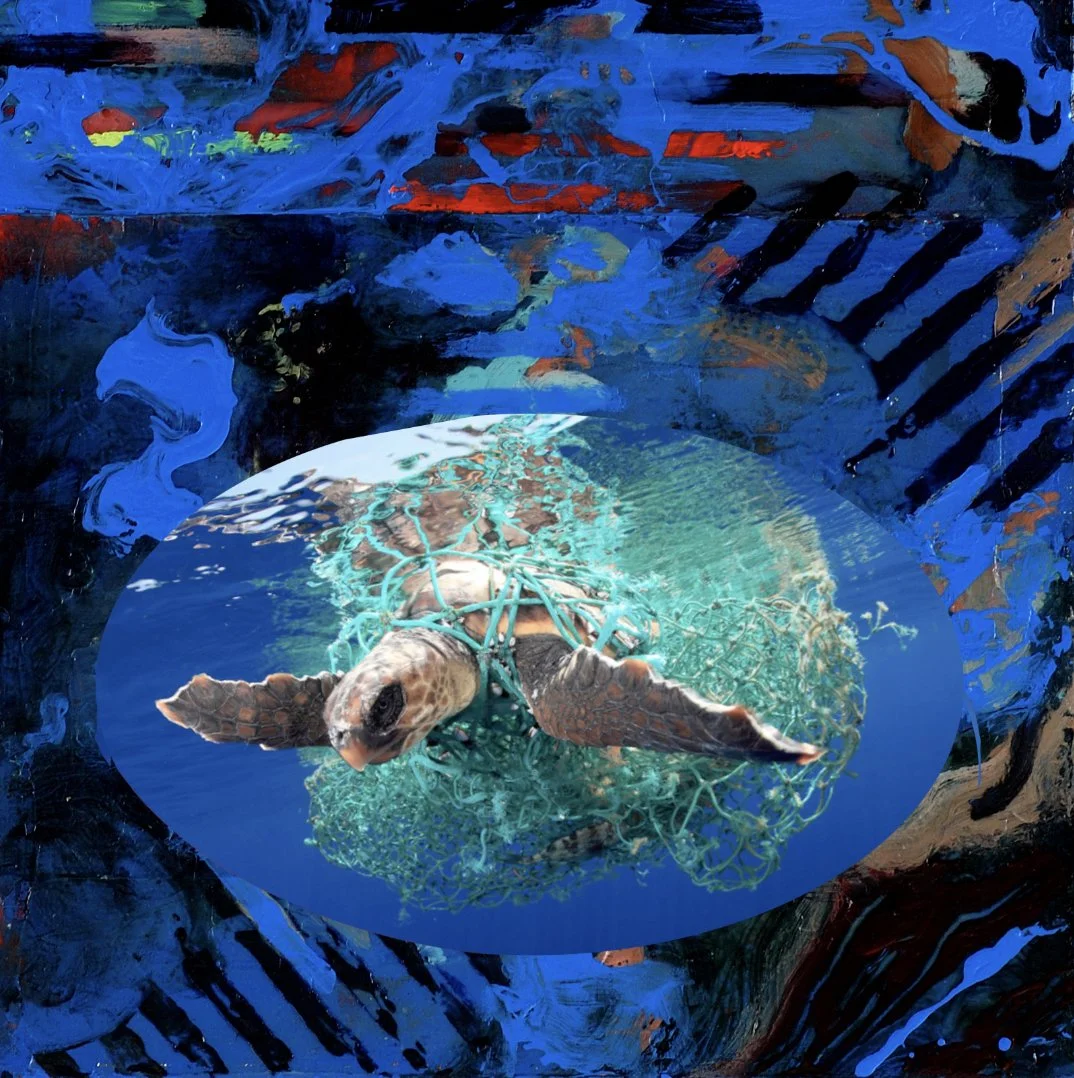Living Waters is a series in progress, addressing the devastating impact of plastic pollution on the oceans, reflecting on a crisis that threatens not only the environment but the sacred balance of creation itself.
The project is an interactive painted panels installation, featuring the oceans' pollution. Twenty canvasses depict underwater scenes with sea life struggling with debris: plastic bags floating in the ocean, sea turtles imprisoned by plastic netting, and creatures swimming amongst masses of plastic in waters. Other panels will feature pristine underwater scenes.
Four panels will be embedded with augmented reality videos. Some of these 1-3 minute videos show scenes of sea life traversing unpolluted ocean areas; others feature information and resources regarding the plastics problem. Using ipads or smartphones, viewers can activate these videos by moving their devices over certain locations.
About the theme:
Water can serve as a reminder of our natural human state: all-pervading and in constant flux. In many cultures water is seen as holy. In Hinduism, God, is known as seated in and part of the water. In Christianity water is used to purify the body and soul, and a vehicle for welcoming people to the faith through baptism. In Judaism, Mikvah is a ritual immersion bath of natural water (rainwater or spring) used for the purpose of nullifying impurity.
On the other hand, millions of tons of plastic are dumped each year into the oceans. 90 Percent of plastic can't be recycled or can only be reused once. At sea, sunlight, wind, and wave action break down plastic waste into small particles, which have been found in every corner of the globe. Millions of animals are killed by plastics every year, from fish to other marine organisms, affecting the entire ecosystem.
The ocean, once a symbol of life, sustenance, and purity, is now suffocated by human-made waste, drowning under the weight of discarded plastics. Through painting, I seek to illuminate this urgent issue, drawing on the wisdom of Jewish teachings to frame the crisis within a larger ethical and spiritual context.
The Jewish tradition speaks about the responsibility of humanity to protect and care for the Earth. In Bereishit (Genesis), we are reminded that God created the world and entrusted us with the stewardship of creation: "And God saw everything that He had made, and behold, it was very good" (Genesis 1:31). This divine mandate calls us to safeguard the beauty and integrity of the natural world. Yet today we find ourselves complicit in defiling the very Earth entrusted to our care, as the oceans choke on the plastic waste we have created.
In my paintings, I juxtapose the delicate balance of marine life with the suffocating presence of plastic debris, exploring the profound dissonance between the ocean and the devastation caused by pollution. The Torah teaches that we are shomrei adamah—guardians of the Earth (Genesis 2:15), and the damage caused by plastic is not just an ecological crisis, but a spiritual one, as it disrupts the harmony of life that was intended. This disruption is reflected in the tangled, suffocating presence of plastics that invade the sea and threaten to drown the life that depends on it.
Jewish texts also emphasize the concept of bal tashchit, the prohibition against needless destruction. The Talmud teaches us that destruction for no purpose is forbidden. Our relentless production and disposal of plastic waste, which poisons the oceans and harms countless marine species, is a violation of this sacred principle.
I visualize this ongoing destruction: the stark contrast between the vibrant life of the ocean and the polluted, plastic-strewn landscape that is increasingly becoming its reality. Each painting is a reflection on the need for teshuvah—a return to our original responsibility as stewards of creation. We must seek to heal what has been broken, to restore balance, and to protect the life that sustains us all.
Ultimately, my work is both a lament and a call to action. We are called not only to witness this destruction but to actively engage in tikkun olam, the repair of the world. Through these paintings, I hope to inspire reflection on our ethical obligation to protect our planet, to stop the flow of plastic into our seas, and to reclaim our role as guardians of the Earth—a role that is sacred, urgent, and essential for the future of all life.
Yona Verwer, Trapped Turtle
Acrylic on Canvas, 30 x 30 inches, 2024
Yona Verwer, Living Waters: Turtle eating Plastic.
Acrylic on canvas, 26 x 40 inches, 2023
Yona Verwer, Living Waters: Crab in Plastic Bag.
Acrylic on canvas, 26 x 40 inches, 2023.
Press received
Press received

